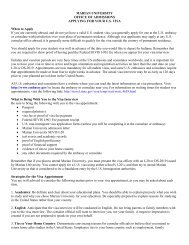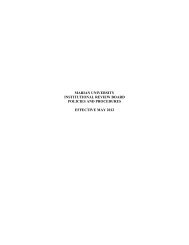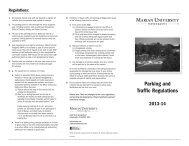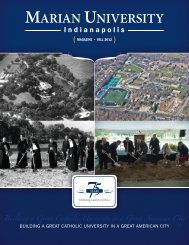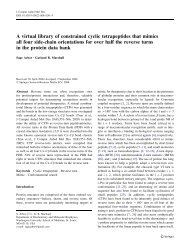2009-11 Marian University Course Catalog, fall 2010 edition
2009-11 Marian University Course Catalog, fall 2010 edition
2009-11 Marian University Course Catalog, fall 2010 edition
Create successful ePaper yourself
Turn your PDF publications into a flip-book with our unique Google optimized e-Paper software.
CHE 100<br />
Elements of General and<br />
Biological Chemistry 4 credits<br />
An introduction to the principles of general chemistry,<br />
organic chemistry, and biochemistry. This course is designed<br />
for students in the health science areas. Four lecture hours<br />
per week. (SEM)<br />
CHE <strong>11</strong>0<br />
Fundamentals of General, Organic,<br />
and Biological Chemistry I 4 credits<br />
Prerequisite: High school chemistry or instructor permission.<br />
Also, high school algebra or MAT 105. A broad-based<br />
introduction to the essential topics of general chemistry,<br />
organic chemistry, and biochemistry. This course is designed<br />
primarily for students seeking a B.A. in Biology, and does not<br />
count towards degree credit for a B.S. in biology or for any<br />
chemistry degree. Three lecture hours and three lab hours<br />
per week. (FAL)<br />
CHE <strong>11</strong>1<br />
Fundamentals of General, Organic, and<br />
Biological Chemistry II 4 credits<br />
Prerequisite: <strong>11</strong>0 or instructor permission. A continuation of<br />
CHE <strong>11</strong>0. This course is designed primarily for students<br />
seeking a B.A. in Biology, and does not count towards degree<br />
credit for a B.S. in biology or for any chemistry degree. Three<br />
lecture hours and three lab hours per week. (SPR)<br />
CHE 151<br />
General Chemistry I 4 credits<br />
Prerequisite: One year of high school chemistry, or either CHE<br />
100 or <strong>11</strong>0, or instructor permission. Also, high school precalculus<br />
with a grade of “C” or better, or MAT 140. A study of<br />
the fundamental laws, principles and theories of chemistry,<br />
including the elements and their compounds, types of<br />
chemical reaction, structures of atoms and molecules, states<br />
of matter, reaction rates, and chemical equilibrium. Three<br />
lecture hours and three lab hours per week. (FAL)<br />
CHE 152<br />
General Chemistry II 4 credits<br />
Prerequisite: 151. A continuation of CHE 151. Three lecture<br />
hours and three lab hours per week. (SPR)<br />
CHE 201<br />
Academic Tools of Science 1 credit<br />
This course will prepare science students with all the essential<br />
tools required to do academic science. Students will learn<br />
how to use the library and the internet to identify high quality<br />
published research. With this as technical underpinning,<br />
students will learn how to write a primary research paper,<br />
how to write a review article, how to make and deliver an<br />
oral presentation. One semester hour, one lecture period per<br />
week, no laboratory period. (FAL) Cross listed BIO 201<br />
CHE 253<br />
Accelerated General Chemistry 5 credits<br />
Prerequisite: Instructor permission. An accelerated study of<br />
the fundamental laws, principles and theories of chemistry,<br />
including the elements and their compounds, types of<br />
chemical reaction, structures of atoms and molecules, states<br />
of matter, reaction rates, and chemical equilibrium. This<br />
course is designed for students with sound backgrounds in<br />
general chemistry and mathematics who would benefit from<br />
a more rigorous foundation for later upper division courses.<br />
Three lecture hours and, three lab hours, and one recitation<br />
hour per week. (FAL)<br />
CHE 270<br />
Environmental Chemistry 4 credits<br />
Prerequisite: <strong>11</strong>0 or 152. The chemistry of the atmosphere,<br />
water, and soil, and a study of the environmental problems<br />
associated with air and water pollution, and chemical waste.<br />
Laboratory focuses on analytical techniques used in the<br />
detection and measurement of environmental pollutants.<br />
Three lecture hours and three lab hours per week. (FAL)<br />
CHE 275<br />
Practical Computational Chemistry 2 credits<br />
Prerequisites: CHE 152 or equivalent preparation. Students<br />
taking this course will learn to model the geometries,<br />
energies, spectra, and other properties of molecules using a<br />
variety of computational techniques. The focus of this course<br />
is hands-on and project-based, with minimal emphasis on<br />
theory. No previous experience with quantum mechanics<br />
beyond general chemistry is required. Subject to project<br />
approval, calculations will make use of national<br />
supercomputing resources. Two lecture hours per week.<br />
(ADD)<br />
CHE 300<br />
Analytical Chemistry 5 credits<br />
Prerequisite: 152 or equivalent preparation. A study of the<br />
theory and techniques of quantitative chemical analysis,<br />
including gravimetric, volumetric, and spectrophotometric<br />
methods together with chemical calculations involving<br />
aqueous reactions and equilibria. Three lecture hours and six<br />
lab hours per week. (2FE)<br />
CHE 305<br />
Organic Chemistry I 4 credits<br />
Prerequisite: 152 or equivalent preparation. A study of the<br />
principles of organic chemistry and the chemical and physical<br />
properties of the major classes of organic compounds.<br />
Laboratory focuses on fundamental laboratory techniques of<br />
organic chemistry, introduction to spectroscopic methods of<br />
compound identification, and general synthetic methods.<br />
Three lecture hours and three lab hours per week. (FAL)<br />
CHE 306<br />
Organic Chemistry II 4 credits<br />
Prerequisite: 305. A continuation of CHE 305. Three lecture<br />
hours and three lab hours per week. (SPR)<br />
81







